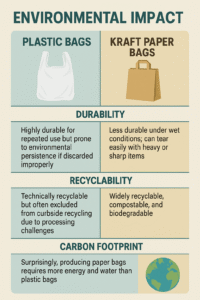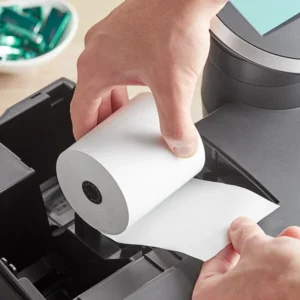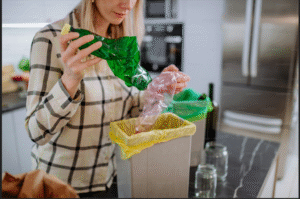Discover the best Eco-friendly trash bags for your home or business. Learn about Compostable, biodegradable, and recycled garbage bags. Go green today!

Table of Contents
- Introduction: Why Eco-Friendly Trash Bags Matter
- What Makes a Trash Bag Eco-Friendly?
- Types of Eco-Friendly Trash Bags
- Eco-Friendly Trash Bags vs. Conventional Garbage Bags (Comparison Table)
- Key Certifications: BPI, ASTM D6400, and More
- Top Benefits of Using Eco-Friendly Trash Bags
- How to Choose the Best Eco-Friendly Trash Bag
- Best Practices for Reducing Plastic Pollution at Home
- Are Eco-Friendly Trash Bags Worth It? Statistics & Facts
- Common Myths & FAQs About Eco-Friendly Trash Bags
- Conclusion & Call-to-Action: Make the Switch to Eco-Friendly Trash Bags
- References
1. Introduction: Why Eco-Friendly Trash Bags Matter
The world throws away over 300 million tons of plastic each year. Much of it comes from single-use items like garbage bags. Most of these end up in landfills, waterways, or oceans, fueling the global plastic pollution crisis.
If you want to reduce your environmental impact, switching to Eco-friendly trash bags is an easy change you can make. You can do this at home or at your business. In this guide, we’ll break down the different types, benefits, and certifications. We will also cover the most commonly asked questions. This way, you can make a smart, sustainable choice.
2.What Makes a Trash Bag Eco-Friendly?
An Eco-friendly trash bag is made to reduce environmental impact through the next:
- Sustainable materials (like plant-based, recycled, or Compostable polymers)
- Non-toxicity (no harmful chemicals)
- Reduced resource consumption during manufacturing
- Designed for circularity (can be composted, biodegraded, or recycled)
These bags aim to break down more naturally, help reduce landfill waste, and support a zero-waste lifestyle.

3. Types of Eco-Friendly Trash Bags
There are three main types of Eco-friendly garbage bags available today:
a) Compostable Trash Bags
- Made from: Corn starch, plant-based PLA, or PBAT blends
- Breakdown: Fully compost in industrial or home composting conditions (check certification)
- Certifications: BPI Certified, ASTM D6400, EN 13432
- Best for: Organic/food waste, zero-waste homes, businesses with compost programs
b) Biodegradable Trash Bags
- Made from: Conventional plastics with additives or substitute polymers
- Breakdown: Decompose faster than standard plastics (time depends on material/environment)
- Important: “Biodegradable” is not regulated—always check for credible certifications!
- Best for: General waste where composting is not possible
c) Recycled Content Trash Bags
- Made from: Post-consumer or post-industrial recycled plastics
- Benefits: Reduces need for new plastic, diverts waste from landfill
- Best for: Office, retail, industrial, and home use where greatest strength is needed
4.Eco-Friendly Trash Bags vs. Conventional Garbage Bags
(Comparison Table)
| Feature | Eco-Friendly Trash Bags | Conventional Trash Bags |
|---|---|---|
| Material | Compostable plant-based, recycled resin | Virgin plastic (HDPE, LDPE) |
| Decomposition | Months to a few years (depending) | Hundreds of years |
| Resource Use | Often lower (esp. recycled/plant-based) | High (fossil fuel derived) |
| Toxins/Chemicals | Non-toxic options available | May release microplastics/toxins |
| Certifications | BPI, ASTM D6400, OK Compost | Usually none |
| Best Use | Green waste, zero waste, all-purpose | General, heavy-duty |
| Cost | Slightly higher, but dropping | Usually lowest |
5. Key Certifications: BPI, ASTM D6400, and More
When shopping for Eco-friendly garbage bags, check for these trusted certifications:
- BPI Certification: Confirms Compostability in industrial settings (BPI Composting Institute)
- ASTM D6400: US standard for Compostable plastics (ASTM International)
- OK Compost (TÜV Austria): Verifies industrial/home Compostability (TÜV Austria)
- EPA Guidelines: Recommends least recycled content for trash bags (EPA Recycled Content Recommendations)

6. Top Benefits of Using Eco-Friendly Trash Bags
Switching to Eco-friendly trash bags offers powerful benefits for both the planet and your daily life:
- Reduces landfill waste and plastic pollution
- Supports circular economy by encouraging recycling and composting
- Lower carbon footprint compared to traditional garbage bags
- Safe for home composting (if certified)
- Improves your sustainability image—important for Eco-conscious businesses
“If just 1 in 10 Americans used one Eco-friendly trash bag per week, it would make a huge difference. Over 200 million bags would be saved from landfills. This would happen each year. This action would lead to a significant environmental impact.”
— Earth 911
7. How to Choose the Best Eco-Friendly Trash Bags
Key factors to consider:
- Bag Type: Compostable, biodegradable, or recycled content?
- Intended Use: Kitchen, bathroom, office, yard waste, commercial, etc.
- Certifications: Look for BPI, ASTM D6400, OK Compost, or EPA-recommended products.
- Strength/Size: Make sure the bag fits your can and waste type (e.g., heavy-duty for commercial, standard for home).
- Price: Eco-friendly bags are now very affordable—compare cost per bag.
- Brand Reputation: Buy from trusted brands that list their materials and certifications.
Tip: PRN Plus offers a range of certified Eco-friendly trash bags for homes and businesses—see our product choice.

8. Best Practices for Reducing Plastic Pollution at Home
- Use Compostable bags for organic/food waste and compost at home or through a curbside program.
- Switch to recycled-content trash bags for general waste.
- Avoid single-use plastic liners in small cans—try reusable liners or empty directly.
- Don’t “wish cycle”—only compost or recycle bags with valid certifications.
- Educate your household and community on plastic pollution and proper waste disposal.
- Go zero-waste: Reduce, reuse, recycle, then compost.
9. Are Eco-Friendly Trash Bags Worth It? Statistics & Facts
- Plastic bags are among the top 10 items found in ocean cleanups each year. (Ocean Conservancy)
- Over 100,000 marine animals die every year from plastic bag pollution. (American Lung Association)
- Compostable bags can break down in less than 6 months in industrial facilities.
- Recycled content bags use up to 60% less energy to manufacture than bags made from virgin plastic (EPA).
Making the switch to Eco-friendly trash bags is a small change with a major impact!
10. Common Myths & FAQs About Eco-Friendly Trash Bags
FAQ Section
Q1: Are Eco-friendly trash bags really Compostable at home?
A1: Only bags certified as “home Compostable” (look for the OK Compost HOME logo) are suitable for backyard composting. Most Compostable bags are designed for commercial composting facilities.
Q2: Will biodegradable garbage bags break down in landfills?
A2: Most landfills lack oxygen, light, and microbes needed for decomposition. Even “biodegradable” bags will not fully break down. Composting or proper recycling is key.
Q3: Are Eco-friendly garbage bags as strong as regular trash bags?
A3: Yes, many modern Compostable and recycled trash bags are just as strong as standard ones for everyday use. For heavy-duty needs, check the thickness (mil/gauge) and product specs.
Q4: What’s the difference between Compostable, biodegradable, and recycled trash bags?
A4:
- Compostable: Break down into organic matter in composting conditions.
- Biodegradable: Break down over time, but the process and outcome vary.
- Recycled: Made from post-consumer or post-industrial recycled plastic.
Q5: Where can I buy quality Eco-friendly trash bags online?
A5: PRN Plus Eco-Friendly Trash Bags offers a curated variety for homes and businesses across the Southeast USA.

11. Eco-Friendly Trash Bags Comparison Table
| Feature | Compostable Bags | Biodegradable Bags | Recycled Content Bags |
|---|---|---|---|
| Material | Corn, PLA, PBAT | Modified plastic blends | Post-consumer/industrial |
| Breakdown | In compost (3–6 months) | Faster than regular bags | Standard recycling process |
| Best Use | Organic waste, zero waste | General trash | Office, home, commercial |
| Certifications | BPI, ASTM D6400, OK Compost | Varies (less regulated) | EPA, SPC |
| Cost | Slightly higher | Moderate | Competitive |
12. Conclusion: Make the Switch to Eco-Friendly Trash Bags
Reducing plastic pollution starts at home and at work. By choosing Eco-friendly trash bags, you’re supporting a healthier planet and a cleaner community. Whether you’re looking for Compostable, biodegradable, or recycled content garbage bags, making the switch is easier—and more affordable—than ever.
Ready to make your home or business greener? Shop Eco-friendly trash bags at PRNPlus.com and join the movement for a cleaner tomorrow!






